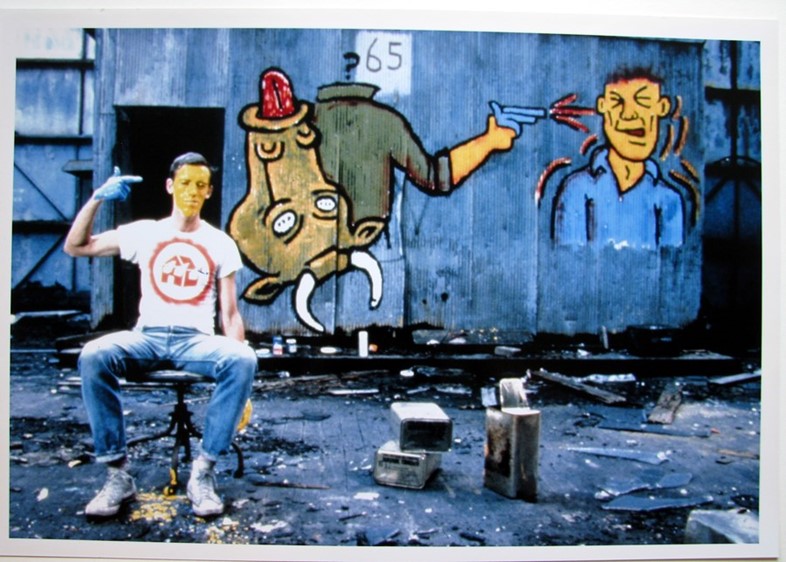Painter, collagist, poet, public scold, filmmaker and performance artist David Wojnarowicz cut a wide swath in the in the narrowest of narrow lanes of the New York art world of the 1980s.
He was a phenomenon of AIDS era East Village art, and a victim of it. As he’s not as well remembered as his contemporaries, Keith Haring or Jean-Michel Basquiat, filmmaker Chris McKim “(Out of Iraq,” TV’s “Sex Change Hospital”) figured a documentary might jar our memories.
McKim’s clever conceit in making a film about an artist known for graffiti, stenciling images over posters and product labels and painting on driftwood and garbage cans, is to conjure his film out of the “found objects” Wojnarowicz left behind.
This terrific and informative documentary made of home movies, friends’ super 8mm film of Wojnarowicz and the hustler-turned-self-taught-artist’s audio cassette diaries and even his home answering machine tapes. And there are interviews with those still living who remember him, most famously New York essayist and social scene observer Fran Lebowitz, sketch in the picture.
There’s also an interview Wojnarowicz did with NPR’s “Fresh Air” hostess Terry Gross, whose questions often begin with lengthy discourses on the subject’s background and career. We barely hear the artist there, but Gross tells much of his story — abusive childhood, teen prostitute, artist — in what passes for a question.
“I tried hard to be normal,” he says, “tried very hard to be accepted. And on some level, it’s just a complete waste of time.”
He also tried his hand at writing monologues, hopped freights to Jamestown, N.D., lost himself in Genet and Rimbaud, sang with a band (3 Teens Kill 4) and moved to Paris and moved back to New York in time to film off his TV a Reagan for president TV ad with its “Make America great again” message.
As he found his voice via guerilla, “outlaw” installations in the abandoned piers of NYC, AIDS and Reaganism came to define him and his work.
“We rise to confront the State,” he wrote. And as he did, and faced the “gay plague” as AIDS was labeled in its early New York days, “we confronted a diseased society as well.”
Friends and lovers pass along their recollections and give testimonials about an artist facing up to his moment, made famous when the NEA pulled funding for a show his “political” and “sexual” work was appearing in. Works such as “Science Lesson,” “Prison Rape” and one that gives this film its subtitle, “F–k You, F—-ng Fa—ts,” made his reputation.
One piece is described thusly — “It looked like tetanus!”
He showed at the Whitney and did a personal installation in the home of the rich, art-dealing/collecting parents of future Trump Treasury Secretary Steve Mnuchin. It was a basement mural/found-objects piece, infested with roaches. On purpose.
“David didn’t really like rich people,” one friend wryly notes.
Endorsed by William S. Burroughs, Wojnarowicz was so famous that upon his death, at the end of the ’80s, his was “the first political funeral of the AIDS era.”
McKim’s film can be seen as a fascinating overview, a peek into a guy who packed a lot of life into 37 years, and a compelling, entertaining prospectus for a feature film biography of this now largely-forgotten artist. If that’s the case, count me in. After you’ve immersed yourself in this genuine New York “character,” unpolished, smart, biting and uncompromising, you might very well feel the same.
MPA Rating: unrated, nudity, sexual content, profanity
Cast: The voices of David Wojnarowicz, Fran Leibowitz, Barry Blinderman, Nan Goldin, Peter Hujar
Credits: Directed by Chris McKim. A Kino Lorber release.
Running time: 1:48




